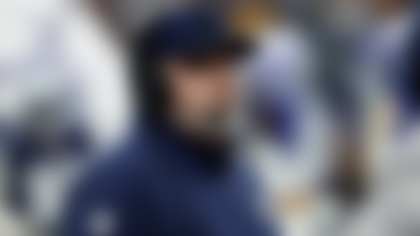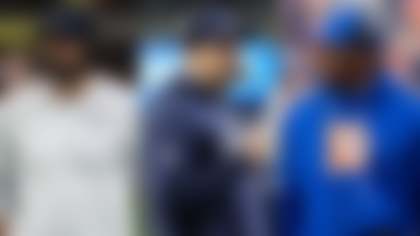MINNEAPOLIS -- The NFL and players spent nearly two hours Thursday arguing before U.S. District Judge David Doty on what the court should do with $4.078 billion in television rights fees. Doty ruled two months ago the the money was secured illegally by the league to build a "lockout fund."
Doty ended the hearing by saying that he would rule on the case in "due season." Both the players and league said that ruling need not be rushed, but the players argued that Doty's ruling on an injunction to put the money in escrow while he deliberates should be expedited.
Doty opened the hearing, by admonishing both sides for a work stoppage that is now the longest in league history. Thursday's hearing took place two months and a day after the lockout went into effect.
"To be honest, I didn't think we'd have this hearing, and I'm a bit disappointed we're having it," Doty said prior to hearing arguments from both sides. Doty added he thought the labor dispute "would be settled by now," and said, "Judges don't like making decisions in business matters like this."
After the hearing, NFL Players Association lawyer Tom Heiden spelled out what the players are seeking in damages: $707 million stemming from the television contract, plus additional undetermined compensation arising from digital and RedZone Channel rights, as well as the extra game given to NBC last fall.
The players are also asking for compensatory and punitive damages that would punish and deter future behavior. That could add a number tripling the original number on to the total for the NFL, raising it well into the billions.
NFLPA outside counsel Jeffrey Kessler argued that the $4.078 billion secured by the league -- approximately $457 million of which doesn't have to be repaid, and the rest of which serves as a no-interest loan -- acts as protection in the event of the lockout and merits "exemplary damages" to be awarded to the players.
NFL outside counsel Gregg Levy responded that the players hadn't sought monetary damages arising from the credit subsidy in earlier hearings, and that "shaped and influenced the NFL's legal strategy," adversely effecting the league's ability to argue its case.
The players cited $400 million in revenue from DirecTV, as well as $40 million from ESPN and $17 million from Verizon, as money that didn't needed to be repaid. They also went over the 2011 totals from each of the league's partners -- $610 million from CBS, $713 million from FOX, $775 million from NBC, $976 million from ESPN and $555 million from DirecTV. In regards to those funds, Kessler said the league "ignored their obligations and conceded their breaches."
"A message needs to be sent," said Kessler. "You must comply with the law of this land."
Levy argued that the league's behavior was "not egregious, outrageous or unconscionable." He said "the question isn't what the NFL could have sought, it's what the networks were willing to pay."
Levy's contention was that DirecTV benefits from its relationship with the NFL, even in the absence of games being played, that the value of digital rights was being blown out of proportion, and that there was no way to prove how much the networks would've paid to get out of lockout provisions written into their contracts.
"They made a strategic judgment that they would rather seek money damages," Levy said, following the hearing. "They're not gonna get the money damages, I'm quite confident, because their proof isn't adequate, as the special master made clear in a binding finding against them. And so they're not entitled to the injunction."
The special master previously awarded the players just $6.9 million in damages, a ruling that the league is asking Doty to uphold.
The players' side argued the "ethics" of the matter in response, and asked that Doty not allow the league access to the $4 billion because of the ongoing labor battle. The NFL has yet to collect much of the $4 billion from the networks, and Levy said at the end of the hearing the league had no plans to start handing out money to clubs.
"What we asked them for on the injunction is that the judge prevent the defendants from using this illegal $4 billion warchest as a weapon against the players during the lockout," said Heiden. "If he's really contending that they're not planning on handing out the money to the teams at the end, then presumably they wouldn't have any objection to Judge Doty issuing an order saying you can't hand it out to the teams."
Active players Chester Pitts of the Seattle Seahawks and Steve Smith of the Carolina Panthers were in attendance at the hearing, as were retired players Sean Morey, Don Davis and Ernie Conwell, as well as NFLPA executive director DeMaurice Smith.
"Today, this judge took under advisement, after he made a ruling that the league violated the law," Smith said. "It came after a history of the National Football League violating the law. What the players have asked for, and what we've consistently asked for, is just for fundamental fairness. Our men want to play, our fans want to enjoy the game. We'd like to be engaged with a business partner that complies with the contracts they sign and the law of this land."
Several big dates are on the horizon on the NFL lockout landscape.
On Monday, court-ordered federal mediation will continue in Minneapolis, under the auspices of Magistrate Judge Arthur Boylan. Commissioner Roger Goodell and NFL general counsel Jeff Pash, who weren't in attendance on Thursday, will be there, as will Panthers owner Jerry Richardson, Bengals owner Mike Brown, Giants owner John Mara, and Steelers president Art Rooney II.
On May 20, the Brady class counsel's response brief on the appeal of Judge Susan Nelson's injunction to lift the lockout is due with the 8th U.S. Circuit Court of Appeals. On May 26, the NFL's response to that is due, and a hearing is scheduled before three judges in St. Louis on June 3.
The NFL has received a temporary stay of Nelson's injunction. The league also sought a longer stay, that would last until the 8th Circuit ruled on the appeal, but there's been no ruling on that yet.



